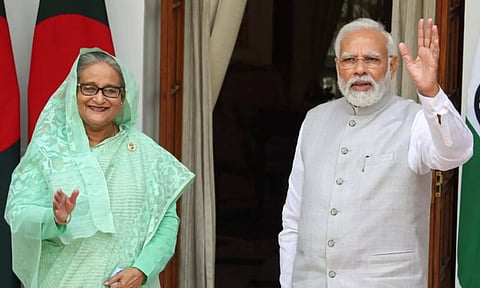

• ARAFATUL ISLAM
NEW DELHI: Bangladesh’s Prime Minister Sheikh Hasina secured a fourth consecutive term in power earlier this year, with her Awami League party taking three-quarters of seats in parliament following what some observers regard as a controversial election. The vote was conducted by keeping almost all top leaders of the main opposition party and over 25,000 of its activists behind bars who were arrested in the run-up to the election on various charges — including arson attacks and vandalism — that some independent observers think were politically motivated.
However, Bangladesh’s neighbour, India, welcomed the election result, with Indian Prime Minister Narendra Modi congratulating Sheikh Hasina on her victory. “We are committed to further strengthen our enduring and people-centric partnership with Bangladesh,” Modi wrote on X, formerly Twitter, after the result was announced.
India shares a 4,100-kilometer-long (2,500-mile) border with Bangladesh. Bilateral trade between the countries exceeded $15 billion in 2021-22. A group of Bangladeshi influencers and political activists launched an “India out” campaign after the January elections, claiming that the Modi government has not only been ignoring its neighbour’s democratic backsliding but also actively backing Sheikh Hasina to stay in power for its own self-interest. Pinaki Bhattacharya, an exiled Bangladeshi physician and influential social media activist living in Paris, announced the latest “India out” campaign in mid-January by urging his millions of followers not to buy Indian products in Bangladesh and abroad to protest against “India’s relentless meddling in Bangladesh’s domestic affairs.”
“A striking example of such interference was the mockery of democracy seen in the January 7 elections, where India’s involvement was pivotal in upholding a regime that blatantly favours India’s strategic, political, and economic agendas,” Bhattacharya, a PM Hasina critic, told DW.
The campaign has received support in Bangladesh on social media, with reports suggesting that some people are favoring alternatives to Indian products in Bangladesh and abroad. Some experts have doubts about the effectiveness of such a campaign as the relationship between the two countries is so deeply entrenched, and Bangladesh has become so dependent on India that achieving a complete boycott of India is unlikely. Ali Riaz, a political science professor at Illinois State University, thinks that there is a political message underpinning this campaign that has implications beyond immediate success.
“The campaign reflects the simmering discontent about India’s disregard to the legitimate grievances of Bangladesh and its role in Bangladesh’s domestic politics,” Riaz told DW.
According to the expert, the perception that India has helped Bangladeshi PM Sheikh Hasina remain in power despite her country’s democratic backslide and poor human rights records, which were condemned by the West, is not unfounded.
“This is not the first time that India came to the aid of the Hasina government, during two previous elections in 2014 and 2018, which were marred by massive vote rigging in favor of the ruling party and boycotts, India stood by Hasina,” Riaz added. The Bangladeshi government denies these allegations.